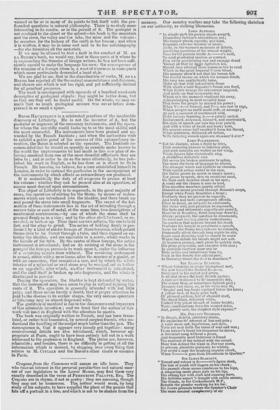Baron HEURTELOUP is a celebrated practiser of the invaluable discovery
of Lithotrity. He is not the inventor of it, but the perfecter or improver of the necessary instruments, and the opera- tor whom the scientific world looks up to as the most skilful and the most successful. His instruments have been praised and re- warded by the French Institute ; and when the authorities wish to exhibit a public proof of the success of this extraordinary in- vention, the Baron is selected as the operator. The Institute re- commended that he should as speedily as possible make known to the world the improvements he had made in this new plan of re- lieving mankind from one of the most dreadful afflictions they are heirs to ; and in order to do so the more effectually, he has pub- lished his work in English, as he has done or is about to do in French. He has also, we believe, for a time established himself in London, in order to instruct the profession in the manipulation of the instruments by which effects so extraordinary are produced.
It is undoubtedly the duty of all surgeons to peruse at least his volume : whether they can be present also at an operation, of course must depend upon circumstances.
The object of Lithotrity is to supersede, in the great majority of cases, the operation of cutting for the Stone, by means of instru- ments which are introduced into the bladder, and there break up and pound the stone into small fragments. The secret of the for- mation of these instruments lies in the art of intruding through a narrow tube or case of metal, at the same time, two descriptions of mechanical contrivances,—by one of which the stone shall be grasped firmly as in a vice ; and by the other shall be bored, or ex- cavated, or broken up. Thus there are two actions, the one to hold fast, and the other to grind. The action of holding firmly is per- formed by a kind of elastic forceps of three tenacula, which permit themselves to be thrust through a tube, and then expand on en- tering the bladder, and are amenable to a screw, which works in the handle of the tube. By the centre of these forceps, the active instrument is introduced ; and on its arriving at the stone in the grasp of the forceps, proceeds to work upon it, under the influence of a revolving motion from without. The revolving instrument is armed, either with a mere borer, after the manner of a gimlet, or with an excavator, that resembles a saw, and by which the whole interior of a spherical or oval stone may be scooped out as hollow as an egg-shell; after which, another instrument is introduced, and the shell itself is broken up into fragments, and the whole is discharged in powder.
During the operation, the bladder is kept distended by water, that the instrument may have room to play in without injuring the coats of it. The operation is generally attended with but little pain ; and there seems hardly a doubt, that if proper attention be paid to the disease in its earlier stages, the very serious operation of lithotomy may be almost dispensed with.
The gratitude of mankind is due to the discoverers and improvers of this admirable invention ; and we trust that the author of this work will meet in England with the attention he merits. The book was originally written in French, and has been trans- lated, or rather half translated, by several surgical friends, who un- derstand the handling of the scalpel much better than the pen. The consequence is, that it appears very loosely put together: many controversial details are also introduced, which, however ap- propriate at Paris, ought to have been entirely left out in a work addressed to the profession in England. The plates are, however, admirable ; and besides, there is no difficulty in getting at all the
information which is desired, by skipping over every thing that relates to M. CIVIALE and the Baron's other rivals or enemies in Paris.


























 Previous page
Previous page